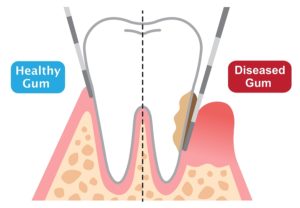 Some patients are resigned to the prospect of developing oral health issues, such as gum disease, as they get older. While the risk of gum disease does increase with age, this condition is far from inevitable.
Some patients are resigned to the prospect of developing oral health issues, such as gum disease, as they get older. While the risk of gum disease does increase with age, this condition is far from inevitable.
When you receive quality care at a family dental practice and take care of your smile at home, you can minimize your risks of gum disease. Practice good oral hygiene habits and know the symptoms of gum disease so that you can follow up with a dentist as soon as possible if you have any concerns.
Keeping Your Gums Healthy Throughout The Lifespan
Gum disease occurs when harmful oral bacteria attack the gum tissue and cause inflammation. Fortunately, there are steps that you can take to reduce the proliferation of these harmful oral bacteria, including:
- Practicing good oral hygiene habits on a daily basis
- Seeing your dentist at least twice a year for professional teeth cleanings and exams
- Eating a smile-boosting diet
- Staying well-hydrated so that you produce sufficient saliva to clear away bacteria
If you have been practicing these habits throughout your life, you are already in a good position to prevent gum disease as you get older. If not, there’s no time like the present to start!
Know The Signs Of Gum Disease
Some patients may develop gum disease even if they’re diligent about home and professional care. If you do develop gum disease, it’s important to follow up with your dentist as soon as possible in order to get effective treatment.
For the best treatment outcomes, you should be diligent about monitoring your gums for symptoms of periodontal disease, including:
- Redness
- Bleeding, even if it only occurs while brushing and flossing
- Swelling
- Persistent bad breath
- Noticeable pockets developing between the gums and the teeth
If you notice any of these symptoms, reach out to your family dental practice ASAP to schedule an appointment.
Risk Factors For Gum Disease
Although gum disease is not a normal part of aging, older adults may face increased risks for gum disease in some aspects. They may have:
- Medication use potentially resulting in dry mouth as a side effect
- Physical or cognitive impairments that interfere with oral hygiene
- Difficulty getting to a family dental practice for checkups
If you are aware of your risk factors, you can work closely with your provider to plan ways to overcome those risk factors.
To learn more about preventing gum disease as you age and find out how you can achieve this goal, call Howl Dental and speak to one of our knowledgeable staff members.
